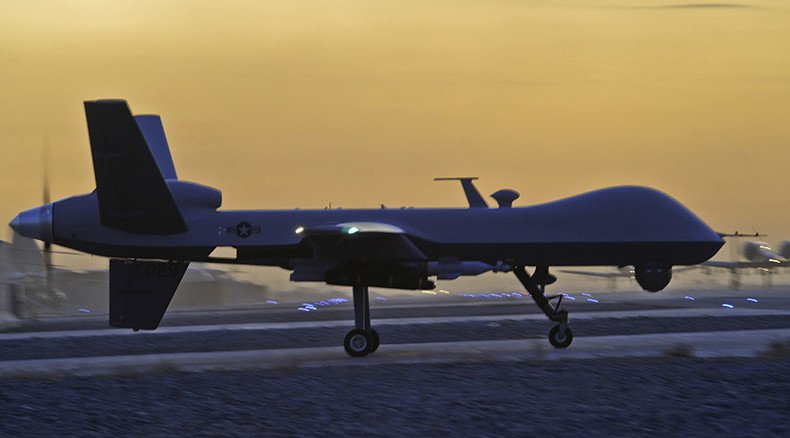Private contractors operate Air Force drones, complicating civilian role in war

Air Force documents reveal not only that the Pentagon is having a hard time recruiting active duty military to “pilot” drones, as defense contractors are filling the vacancies. Military lawyers fear this blurs the line between soldier and civilian.
The "lack of appropriately cleared and currently qualified MQ-9 pilots is a major concern," reads a five-page redacted Air Force document from August 24, referring to MQ-9 Reaper drones leased to a small defense contractor. The same document calls for the private concern to help cope with "recent increased terrorist activities" through Air Force contract terms.
US contractor’s cranes used for public hanging in Iran [VIDEO] https://t.co/L766siQ6uo@TheResidentpic.twitter.com/S5zFbETSUg
— RT America (@RT_America) November 17, 2015The Pentagon is hundreds short of its recruitment goal of 1,281 drone operators.
The Air Force currently flies 60 Reaper "combat air patrols" every day, and by 2019, the goal is to have 90 daily. Despite the “combat” name, patrols by contractors would never involve firing missiles or even aiming them. The non-stop patrols would cover the same areas where strikes take place, but the purpose would be information gathering or capturing video for other analysts.
Military lawyers still see that as part of the “kill chain.” The chain consists of the following steps: 1) Find the target, 2) map the location, 3) track its movements, 4) aim a laser to pinpoint it, 5) fire the missile and 6) assess the damage.
"Planning and execution of these missions will be carried out under the same oversight currently provided for military aircrews, and the resulting sensor information will be collected, analyzed, transmitted and stored as appropriate by the same military intelligence units," Benjamin Newell, Air Force spokesman, told the Los Angeles Times.
The Times references a 2013 Air Force Law Review article about contractors in combat zones. Citing a February 2010 Predator drone missile launch, which killed 15 Afghani civilians, the military journal acknowledges the operation "was largely based upon intelligence analysis conducted and reported by a civilian contractor."
"It is imperative that Defense Department contractors not get too close to the tip of the spear," the 2013 journal article continued.
In a contrasting opinion, Retired Air Force General David A. Deptula, former deputy chief of staff for intelligence, surveillance and reconnaissance, told the Times, "Weapons deployment only involves less than two percent" of drone operations.
Drone operators could be liable for damages if new bill passes [VIDEO] https://t.co/czCIVMTur6@portnayanyc
— RT America (@RT_America) November 21, 2015There are two civilian contractors currently working with the Air Force. Texas-based Aviation Unmanned was founded three years ago by a former drone pilot. The second is the many times larger San Diego-headquartered Atomics Aeronautical Systems Inc., the sole provider of weaponized drones to the military.
The document approving the classified yearlong contract with General Atomics, from April 15, says the Reaper drone the company is to operate “is needed immediately.” In addition, it calls for the company to hire drone operators, crewmembers, ground control teams, and sensor operators, though the description of the sensors was redacted. Also redacted in both the General Atomics as well as the Aviation Unmanned contract was the total cost.












